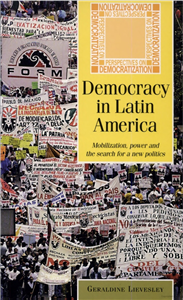Democracy in Latin America
by Geraldine Lievesley
Description
More Information
Rights Information
Albania, Algeria, Angola, Argentina, Armenia, Australia, Austria, Bahrain, Belgium, Belize, Benin, Bolivia, Bosnia and Herzegovina, Botswana, Brazil, Bulgaria, Burkina Faso, Burundi, Cameroon, Canada, Cape Verde, Central African Republic, Chad, Chile, China, Colombia, Comoros, Congo [DRC], Congo, Republic of the, Costa Rica, Ivory Coast, Croatia, Czech Republic, Denmark, Djibouti, Ecuador, Egypt, El Salvador, Equatorial Guinea, Eritrea, Estonia, Ethiopia, Faroe Islands, Finland, France, French Guiana, Gabon, Gambia, Georgia, Germany, Ghana, Greece, Guatemala, Guinea, Guinea-Bissau, Guyana, Honduras, Hongkong, Hungary, Iceland, India, Indonesia, Iran, Iraq, Ireland, Israel, Italy, Japan, Jordan, Kazakhstan, Kenya, Kuwait, Latvia, Lebanon, Lesotho, Liberia, Libya, Lithuania, Luxembourg, Macau, China, Macedonia [FYROM], Madagascar, Malawi, Malaysia, Mali, Malta, Mauritania, Mauritius, Mayotte, Mexico, Mongolia, Montenegro, Morocco, Mozambique, Namibia, Netherlands, New Zealand, Nicaragua, Niger, Nigeria, Norway, Oman, Pakistan, Panama, Paraguay, Peru, Philippines, Poland, Portugal, Puerto Rico, Qatar, Reunion, Romania, Russia, Rwanda, Saint Helena, Sao Tome and Principe, Saudi Arabia, Senegal, Serbia, Seychelles, Sierra Leone, Singapore, Slovakia, Slovenia, Somalia, South Africa, South Korea, Spain, Sri Lanka, Sudan, Suriname, Swaziland, Sweden, Switzerland, Syria, Taiwan, Tanzania, Thailand, Timor-Leste, Togo, Tokelau, Tunisia, Turkey, Uganda, Ukraine, United Arab Emirates, United Kingdom, United States, Uruguay, Venezuela, Vietnam, Western Sahara, Yemen, Zambia, Zimbabwe, South Sudan, Cyprus, Palestine, Bangladesh, Cambodia, Liechtenstein, Azerbaijan
Endorsements
This book offers an insight into the democratic processes and institutions in Latin and Central America. It analyses the different political systems and the challenges to them from the Left and popular movements. Lievesley questions how far democracy is embedded in Latin and Central American and asks what constitutes citizenship in political cultures which remain highly differentiated in terms of the structures and relations of power. She does this through an evaluation of the two distinct perspectives of democracy: the liberal pacted and the radical participatory models. Established political systems, systems in transition from military to civilian rule and Socialist systems are viewed through the prism of these two models. The inter-relationship between state, military, political parties and popular movements are examined with a view to determining the possibility of the emergence of a new politics, which would be inclusion rather than exclusionary and would pursue social justice. The book will provide a stimulating assessment of the region's politics for undergraduates and will provoke debate for postgraduates.
Reviews
This book offers an insight into the democratic processes and institutions in Latin and Central America. It analyses the different political systems and the challenges to them from the Left and popular movements. Lievesley questions how far democracy is embedded in Latin and Central American and asks what constitutes citizenship in political cultures which remain highly differentiated in terms of the structures and relations of power. She does this through an evaluation of the two distinct perspectives of democracy: the liberal pacted and the radical participatory models. Established political systems, systems in transition from military to civilian rule and Socialist systems are viewed through the prism of these two models. The inter-relationship between state, military, political parties and popular movements are examined with a view to determining the possibility of the emergence of a new politics, which would be inclusion rather than exclusionary and would pursue social justice. The book will provide a stimulating assessment of the region's politics for undergraduates and will provoke debate for postgraduates.
Author Biography
Geraldine Lievesley is Senior Lecturer in Politics at Manchester Metropolitan University
Manchester University Press
Manchester University Press is a leading UK publisher known for excellent research in the humanities and social sciences.
View all titlesBibliographic Information
- Publisher Manchester University Press
- Publication Date September 1999
- Orginal LanguageEnglish
- ISBN/Identifier 9780719043116 / 0719043115
- Publication Country or regionUnited Kingdom
- FormatPrint PDF
- Pages232
- ReadershipCollege/higher education; Professional and scholarly
- Publish StatusPublished
- Dimensions216 X 138 mm
- Biblio NotesDerived from Proprietary 2634
- SeriesPerspectives on Democratic Practice
- Reference Code4274
Manchester University Press has chosen to review this offer before it proceeds.
You will receive an email update that will bring you back to complete the process.
You can also check the status in the My Offers area

Please wait while the payment is being prepared.
Do not close this window.



